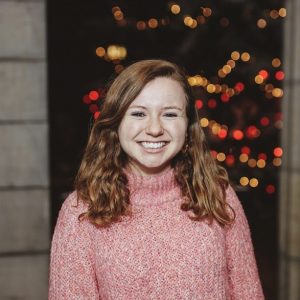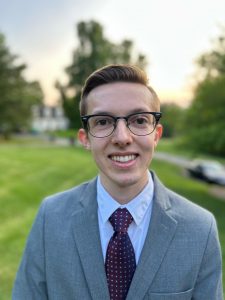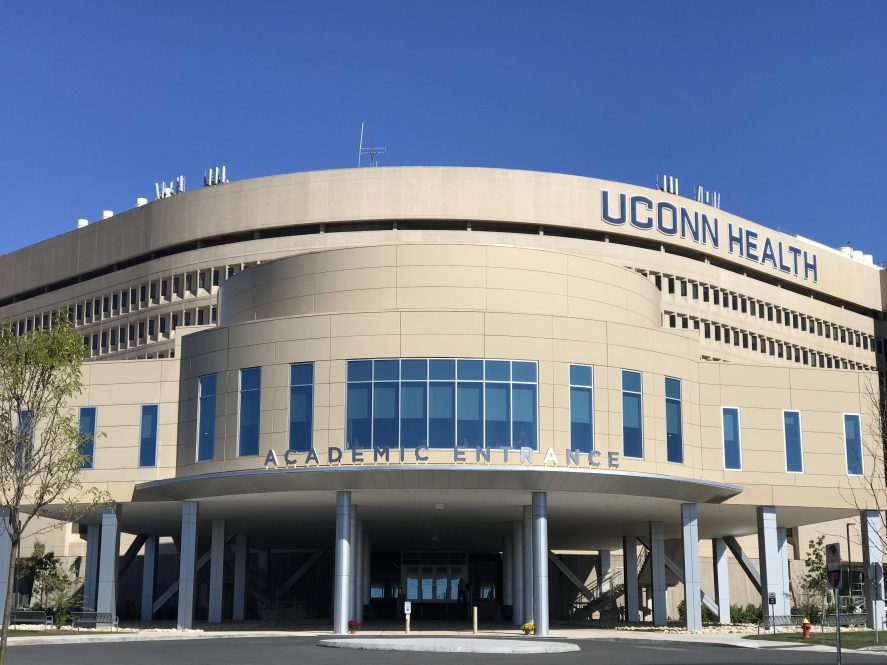Nicholas Hall graduated from undergrad at UConn with a degree in economics and political science last spring and has started his fifth year in the Master of Public Health Policy Program at UConn. He knew that part of his master’s program would include a yearlong internship placement in either the state or local government or a nonprofit. His interest was in the Department of Public Health (DPH), so he applied and was selected for that placement for the academic year, but he wanted to get started early and was referred to The Connecticut Public Health Fellowship Program (CT PHFP) workforce development program managed by the Yale School of Public Health.
The CT PHFP was created in response to the slowly shrinking public health workforce over the last two decades in the U.S. The program aims to build interest in public health careers by supporting third- or fourth-year undergraduate or graduate-level students at an accredited institution studying in a relevant public health degree program. Students are provided with a structured opportunity to experience public health practice and learn about public health careers at high-quality public field placements at the Connecticut Department of Public Health, local health departments, and community-based agencies around the state of Connecticut.
 Mary Looney of West Hartford is in her second year in the Master of Public Health at UConn Health with a focus on environmental public health. She was excited to find the program through the West Hartford/Bloomfield Health District where she has started her fellowship in the environmental health program.
Mary Looney of West Hartford is in her second year in the Master of Public Health at UConn Health with a focus on environmental public health. She was excited to find the program through the West Hartford/Bloomfield Health District where she has started her fellowship in the environmental health program.
“I think it is a really great program because it is focused on building a Connecticut workforce and as a resident I want to work here and contribute to the state,” says Looney.
Host agencies provide students with a structured opportunity to experience public health practice and to learn about public health careers. The goal is to provide fellows with a real-world understanding of health equity and the social determinants of health while learning from public health practitioners who share their knowledge and experience with future public health professionals while cultivating a learning culture in their agency.
“In the wake of the COVID-19 pandemic, a primary focus of our department is ensuring that we develop a sufficiently sized, well-trained, and more diverse public health workforce that is ready to respond to whatever emerging infectious, environmental, or other public health threats we will face in the future. In developing the Public Health Fellowship Program, we are supporting that mission by raising the standard for experiential learning in public health in our state and providing an opportunity for students from a variety of backgrounds and academic programs, both within and outside of public health, to explore public health careers and experience the critical work that local, state, and non-profit public health agencies do in communities across Connecticut every day,” says Public Health Commissioner Manisha Juthani.
 Hall had an internship lined up for the academic year with the State Department of Public Health, but through the fellowship program was able to start early this past summer and complete the fellowship in ten weeks. He has been working on a large overarching project at DPH focusing on helping develop an interactive data dashboard for areas such as practitioner licensing and the EMS system, which is currently being manually pulled when needed. He was also able to work with the Department of Social Services, attend meetings, and analyze how financial issues within facilities can turn into quality-of-care issues and help identify facilities that are struggling earlier in the process and identify ways to help.
Hall had an internship lined up for the academic year with the State Department of Public Health, but through the fellowship program was able to start early this past summer and complete the fellowship in ten weeks. He has been working on a large overarching project at DPH focusing on helping develop an interactive data dashboard for areas such as practitioner licensing and the EMS system, which is currently being manually pulled when needed. He was also able to work with the Department of Social Services, attend meetings, and analyze how financial issues within facilities can turn into quality-of-care issues and help identify facilities that are struggling earlier in the process and identify ways to help.
“My time with DPH this summer and going forward has increased my interest in public health as a career, especially as it relates to economics,” says Hall. “It’s really showing me that public health is a diverse field with many different opportunities.”
Looney whose undergraduate degree at McGill University in Montreal Canada was in health geography and environmental studies that focused on how geographical location impacts health is interested in continuing in the field as she fulfills her fellowship at the West Hartford/Bloomfield Environmental Health Programs. Her 200 required hours recently started and will participate in restaurant inspections, housing inspections, and participates in water quality testing.
Out in the field, Looney is learning the common violations that happen in the various areas that are inspected, such as restaurants and with this data, will help the district create educational materials to provide to the leadership of establishments. The plan is to provide stakeholder engagement with a goal over time to decrease violations.
Looney’s ultimate goal is to be a Registered Sanitarian at a health department and likes the amount of opportunity and experience the program provides to experience the roles and functions of a health department. In addition to the fellowship, Looney is a full-time graduate student who works as a teaching assistant at UConn in Storrs and works as a storm water educator for the state at UConn Extension.
Currently, the program is supporting fellows from more than 20 universities in and around Connecticut and seven of the fellows are affiliated with the University of Connecticut and its undergraduate and graduate public health programs.
In addition to a stipend, the students receive coaching and administrative support throughout the field placement. The program offers consultations for students and mentors, an orientation for fellows, and an evaluation to connect students and agencies. After the program concludes, the program leaders remain available to the students for career coaching.
“The program is well run and those managing the program are regularly reaching out and connecting the fellows,” says Hall. There were several professional development opportunities where we learned about topics such as public health communications and infectious disease emergency response. We toured state labs and met with a state representative on the public health committee in the state capital. It was really a great learning experience.”
“The orientation was the best I’ve ever attended,” says Looney. “They did an excellent job in allowing fellowship participants to connect with each other and share how we felt about the upcoming experience. There is so much opportunity to connect with others and have new experiences, that help you identify where you may want to focus your career.”
The Public Health Fellowship Program is managed by Yale School of Public Health Office of Public Health Practice (OPHP) in collaboration with DPH and other public health agencies, and academic and community partners. For more information about the fellowship program, contact Nikole Allen at nikole.allen@yale.edu.



